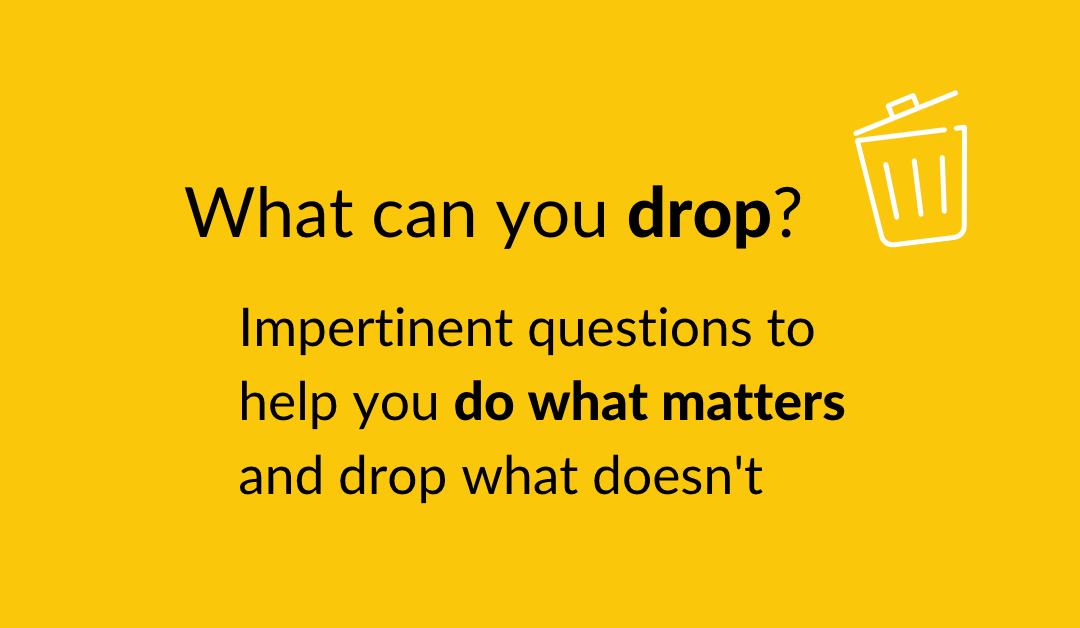Ugh. My client’s response at mere mention of that task. 😣 But why such doom? Was it boring, or tricky, or scary? Nope.
And yet an unassuming item on the to-do list had become insurmountable – and thrown a brilliant leader into calamity. Not of the racing heart, bitter self-doubt variety. This was altogether more lackadaisical. My poor client hadn’t crashed, so much as gently roly polied into the effort swamp.
What is the effort swamp?
Take a look at your to-do list. Which item stubbornly resists removal? Or keeps falling off? Or spurs you into high performance procrastination? There’s a good chance it’s belly flopped into the swamp.
The effort swamp tends not to affect the big and dramatic, or even unutterably dull, so much as the squashy middle. Where the rewards seem simply too intangible, incremental or snoozily mañana.¹ And where boredom arises less from the Thing itself than the endless not-doing of it.
Stuff you can do, would benefit from doing, but also won’t die from not doing often thrives in the effort swamp. Which perhaps explains another of its intriguing features: the self-stymie. You don’t do it, so there’s no benefit, so you were right not to do it. QED. 🤷♀️ A glorious cart-before-the-horse call to inaction.²
A few IRL examples:³
A client who hasn’t got round to reviving a valuable learning exchange because the admin might get onerous
Even though they could cap the numbers, or crowdsource a solution (or… whisper it… discover there’s not that much demand)A mate who never quite has time to sort out their website because it doesn’t drive much traffic⁴
Even though it doesn’t drive much traffic because it doesn’t work properlyAnd me(a culpa)⁵: a product I haven’t finished because the sales might not recoup the faff
Even though they definitely won’t if it never goes on sale 🙄
What with the not dying thing, the effort swamp is easy to dismiss. But being not bovvered is, annoyingly, quite a lot of bother. Thinking about whether to do the Thing is effort. Finding stuff to do instead is effort. Bashing yourself over the head for not making the effort is, yep, effort. It’s just not effort well spent. So what to do?
Ask impertinent questions 🤔
Does it actually matter?
What might happen if you just get on with it? Why is it more strategic not to bother? What might happen if you never do it?Are you luxuriating in the swamp?
Which obstacles are real and which imagined? Where are you moved by a spirit of perversity? Where are you cosying up to being crap?⁶Who might you become?
Who might you be if you climbed out of the swamp? Who might you be if you don’t? Which is scarier?
Fancy an expanded version of these Impertinent Questions? Download it here. Keen to get nosy every day? You might like my month of Impertinent Questions. (Fear not – you get weekends off.)
Budge the grudge
The effort swamp is often mired in a perception of drudgery – and real resentment. One day you’re mulling over the task; the next you begrudge everything it stands for. Like my mate who agreed to speak at an event, couldn’t decide what to speak about, and then told me all talks were boring, stupid and futile anyway. 😫⁷ Druge begets grudge in almost touching mutualism.
So get curious. Where might you find the fun and skip the swamp? Which bits are truly unavoidable? How might your ugh be another’s ooh?⁸ Even if the drudge (and grudge) doesn’t crumble under interrogation, at least you know what’s what. And that gives you a chance to make it less boring/tricksy/draining.⁹
Start anywhere, strategise en route
Leaders are frequently encouraged to set the course before they set off.¹⁰ And (provided you’re pivot-ready) that’s smart. But when you’re in the effort swamp? Not so much. Because you probably know the route and destination. You just can’t be arsed to go.
At which point, setting off from anywhere, in any direction, at least sets you in motion.¹¹ And offers a clearer view of what’s ahead. Yes, it might’ve been smarter to start elsewhere. And yes, you might have to change course. But that might’ve happened anyway. And at least you’re not still stranded at shore.
Know when to fold ‘em
Look around you. What’s changed since you stumbled into the effort swamp? Does the Thing still matter? Do you still care? What might you gain by ditching it altogether? And how will you feel: like a weight’s been lifted, or like you’ve dropped the ball?
Sure, sometimes you have to grit your teeth and crack on.¹² But there’s merit in knowing when to say feck it, I’m out.¹³ And to acknowledge that, if you haven’t done it yet, you’re just not going to. At least you’ll be making a choice. And freeing up all that effort for something you might want to do instead.
Goodness, you’ve read right to the end! If you’re new here, 👋 and many thanks for subscribing. And if you’re a long-standing (suffering?) reader, hearty cheers for sticking around. 🙌
If you’d like even more from me, there’s my month of Impertinent Questions, a 30-second read direct to your inbox. Actual real people have said nice things about it like ‘just so good’ and ‘I think it’s magical’ [*blushes with gratitude*]. There’s also my small back catalogue of blogs and now slightly old-ish podcast with still excellent guests. And if you’d like to chat curious coaching or leadership learning, just hit reply. And that’s it. PHEW! See you next time!
Keen to get curious and fancy a spot of help?
Get intensely curious about who you are, who you’re not, and what actually matters with Impertinent Questions. My nosiness meets your context each weekday for a month.
Get curious with The Curious Leader newsletter direct to your inbox. Longform, practical, personal opining on curiosity in leadership. Like today’s on FOBFO-busting, or this one on owning your success.
FOOTNOTES
1 A sort of Goldilocks gone wrong, where just right is just wrong.
2 Although the April 1907 edition of Popular Mechanics notes that “the very latest Paris novelty in the vehicle line is a four-wheeled surrey in which the cart is actually before the horse.” And (lolz) that “another feature which attracts attention is the driver, who is a woman.” (Also, just so you know, the first story on that page references suicide.)
3 To everyone who shared their effort swamps with me: thank you! To everyone else: don’t judge. I reckon we’ve all got ‘em lurking somewhere.
4 This came up So Many Times, with many a website/CV/profile update stuck in swampy sludge (including my own 😬).
5 This blog is nothing if not meta. Alarmingly, it might be nothing but meta. 😬
6 I’m all for purposeful crapness, as distinct from the feckless sort in which you give good sense the slip.
7 It was quite the diatribe – but, predictably, he was brilliant in the end! 🔥🙌😂
8 Their opportunity to gain skills/kudos/recognition, rather than yours to get rid at their expense – obvs.
9 Perhaps by deploying Second Brain, or being somewhere other than your desk, or playing it for laughs to boost your creativity (or just keep you awake).
10 Not least by me! 👋
11 It’s like steerageway, a sailing thing my mate Nick told me about: you can’t steer until you’re moving.
12 One Step Forward might help if so.
13 Or to quote our Ken: you gotta know when to hold ‘em, know when to fold ‘em. Apparently while performing a slow, polite striptease.





